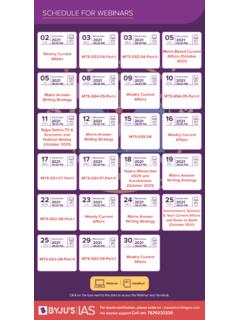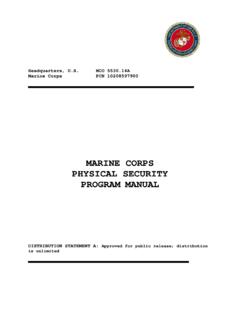Transcription of EXECUTIVE SUMMARY EXAMPLES
1 EXECUTIVE SUMMARY EXAMPLES The EXECUTIVE SUMMARY (1-2 pages) will eventually be given to judges at the Semi-Finals and Final Round of the competition. Your document should quickly summarize: the problem, your idea, and the benefits of your solution. The format can be a bullet-point list or it can contain more graphics. For your first draft, focus on content rather than design; make sure to include the basics of your project and the SUMMARY of your solution. For the revised drafts, focus more on the design and the function of this piece of paper as a takeaway for the judges. See five great EXAMPLES below! CLOSING SCHOOLS, OPENING OPPORTUNITIESThe creation of The School Redevelopment Authority will revitalize communities across Philadelphia that are the victims of closing schools and shifting goal of the SRDA is to acquire and develop the former school buildings.
2 After performing light modifications and low-cost improvements, the SRDA will divide and lease the buildings to a mix of tenants both non-profit and for-profit to create a balanced, income producing portfolio. Our innovation is in the market-based approach to asset management. Working under the Philadelphia Redevelopment Authority, and in collaboration with neighbors, community leaders and potential investors, the SRDA decides on a theme for the redevelopment of each building: HEALTH AND FAMILIESThe schools will house community clinics, counseling centers and low-cost healthcare facilities improving the health and wellness of AND TECHNOLOGYA home for business incubators, entrepreneurship hubs, small workshare office space and neighborhood internet and computer centers, bringing economic vibrancy and opportunity to Philadelphia AND INDUSTRYT ransformed into artist studios, workshop spaces, small-scale manufacturing and fabrication facilities, the school buildings will house up-and-coming artists and micro-industries.
3 NUTRITION AND AGRICULTUREA place for community gardens, grocery stores, weekend farmer s markets, and local food entrepreneurs, these programs will address the expansive food desert throughout low-income neighborhoods in CARE AND EDUCATIONA llows school buildings to be used for a mix of educational and recreational purposes, such as athletic facilities, day care centers, nursery schools, charter schools and adult education Policy Challenge 2012 Team 9 Closing Schools, Opening OpportunitiesTHE UNIVERSITY OF PENNSYLVANIA PUBLIC POLICY CHALLENGE, 2012 TEAM 4 Habilita! (Empower!) Lee Every William Moen Thomas Molieri Marissa Prianti Jason Riley In the past decade, the Latino population of Philadelphia has increased by 46% to 181,292 people, or of the city s overall population.
4 The majority ( ) of school-aged Latinos are enrolled in the city s public schools. Their performance, however, is dismal, with only 43% of Latinos graduating high school in four years. Given that the School District of Philadelphia (SDP) has made layoffs in the past year, endured a very public management crisis, and faces an additional $629 million in cuts this year, there is a clear need for innovative approaches to enhance student performance without further burdening the district. A significant body of research links parents involvement in their children s educations to student success in the classroom. Philadelphia s Latino population faces significant barriers to this involvement, including a language barrier, low parental literacy rates, and lack of computer literacy/access among parents, to name a Facing many of the same challenges, the Denver school system launched La Educa in 2009.
5 La Educa is a radio program that airs three times per week on a Spanish language station. It informs parents of what is taking place in the district, the rights and responsibilities of students and parents, and features a call in session that allows parents to direct content. The initiative was based on the idea of meeting Latino parents where they are. Many work in service industry occupations where they have access to radio throughout the day. In its first year, La Educa had 54,200 listeners. Today, the show averages approximately 100 callers per month. The Denver program is run out of the Denver Public School District s Office of Multicultural Affairs. We propose to launch a similar initiative in Philadelphia, but with a different model.
6 As noted above, SDP is not in a position to take on new programming. There is, however, a very active network of Latino advocacy organizations that can be leveraged to develop a partnership between Spanish language radio, community development organizations, and SDP to make this initiative a success. The Denver Public School District has offered its support and guidance in the development of this initiative. We have begun conversations with Latino community organizations including Juntos and Congreso de Latinos Unidos. The Spanish language radio station El Voz has agreed to partner on the initiative, including production of the show, provision of the on-air talent, and air time.
7 Members of the School Reform Commission have agreed to meet with our team to brainstorm the model, partners, marketing, and funding. Additionally, the Archdiocese of Philadelphia s Office of Multicultural Affairs has offered advertising support, and SDP s Multilingual Family Support Office has pledged programming assistance. At this stage, we envision a Spanish language radio program for parents that will keep them informed of what is happening in the school district, and provide them with the knowledge and resources necessary to participate more fully in their children s educations. We will also explore the possibility of podcasts. Both the radio program and potential podcasts would be implemented at no cost to the city or SDP.
8 1 Parental Involvement and Student Achievement: A Meta-Analysis by William Jeynes, Family Involvement Research Digests, December 2005. Accessed at Parental Effort, School Resources, and Student Achievement by Karen Conway and Andrew Houtenville, Journal of Human Resources, Spring 2008. Accessed at re:Mind Fels Public Policy Challenge 2013 page1 re:Mind Closing Gaps in Mental Health Continuity of Care EXECUTIVE SUMMARY re:Mind is an appointment reminder service targeting individuals discharged from inpatient mental health hospitalizations. re:Mind calls for the creation and adoption of a cheap, simple, and research-supported intervention that addresses the #1 reason patients miss their initial appointment forgetting.
9 By facilitating successful establishment of outpatient care, re:Mind has the potential to save the City millions of dollars in wasted time and preventable hospitalizations, while preserving the mental health of thousands of our fellow Philadelphians. OUTCOMES Short term: improve initial outpatient mental health appointment attendance rates. Intermediate term: decrease rates of re-hospitalization, shorten wait time for initial appointments, reduce lost revenue and health care costs associated with no-show and readmissions. Long term: improve lifetime outcomes for mental health consumers, create a pathway to policy for future policy initiatives. THE PROBLEM WHAT S WRONG?
10 In Philadelphia, hospitals discharge upwards of 11,000 patients every year from inpatient acute psychiatric As part of a movement towards recovery-oriented treatment, the standard practice is to ensure continued care by scheduling an appointment in advance of discharge connecting patients to an outpatient However, on average only 42% of those initial appointments are Research indicates that the most common single reason cited for non-attendance at mental health follow-up appointments is forgetting the SO WHAT? Serious mental illnesses generally require long-term treatment to maintain Patients who miss their initial outpatient appointment are less likely to adhere to their medications and treatment plansvii and up to 50% of patients who miss appointments drop out of scheduled careviii.








